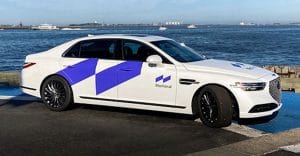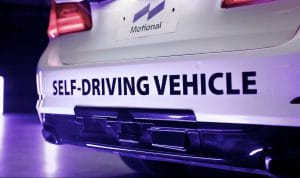Most parents don’t take nearly five months to name their new “child,” but it’s taken Hyundai and Aptiv, the big automotive supplier, that long to come up with the right one for the collaboration in autonomous vehicles they launched in March — Motional.
The two words combined to form the new moniker are pretty clear; however, the rationale cements the mashup of motion and emotional. Kevin Clark, Aptiv CEO, said in a statement posted on the Aptiv website the new name connects two words motion and emotional that capture the essence of self-driving vehicles.
Motion speaks to the movement of driverless vehicles enabled by the company’s technology, supported by decades of experience moving the industry forward. Emotional evokes the company’s people-first approach and focus on building confidence in autonomous vehicles, Clark added.
(VW signs $2.6B deal with Argo AI, joins Ford with vehicle development.)
“In the automotive industry, two things are critical: innovation and trust. You cannot have one without the other,” Clark said.
The company is just the latest in the segment to unveil a new name designed to attract attention, be it kind or unkind. Some of the players include Aurora, Argo, Cruise and Waymo, that have staked out a spot in the autonomous vehicle universe, which is becoming its own distinct segment — with their own distinct names.
However, those have fared better than the most recent new name in the automotive universe: Stellantis, the corporate name for the operational side of the eventual merger of Fiat Chrysler and PSA. The name borrows from the Latin verb “stello” meaning “to brighten with stars,” although it did draw comparisons to a new pharmaceutical product or an obscure relative of a praying mantis.
That said, it’s actually meant to reflect the “new and ambitious alignment of storied automotive brands and strong company cultures that in coming together,” according to the joint statement from the companies.
(GM to build Cruise Origin, electric pickup and other EVs at Detroit plant.)
However, Motional’s directive is clear: the development and commercialization of SAE Level 4 vehicles. This means autonomous vehicles that perform all driving tasks. Motional will begin testing fully driverless systems in 2020, and its driverless systems and supporting technology will be available for robotaxi providers and fleet operators in 2022.
While Motional continues its progress developing and commercializing a production-ready autonomous driving system, Aptiv will help pave the way for self-driving vehicles with advanced driver-assistance systems (ADAS) solutions that save lives today and create trust in highly automated vehicles.
The COVID-19 pandemic and the related global recession have reduced spending on AV research, but the research is continuing.
“Motional, in all of its previous forms, has been leading driverless technology for decades. Our DNA – a combination of Aptiv’s expertise in advanced technology and Hyundai’s leadership in both vehicle manufacturing and R&D – is uniquely powerful and positions us to fundamentally change how people move through their lives,” said Karl Iagnemma, president and CEO, Motional.
“What we’re building is more relevant than ever. The pandemic has challenged the global community to re-think transportation, and governments and individuals want more and better options. We’re excited to bring driverless technology safely and comfortably into everyday life.”
(FCA, PSA pick name for post-merger company: Stellantis.)
Aptiv and now Motional have grown out of General Motors spinoff of its parts making unit back in 1999. Aptiv and Delphi spit in 2018 with Aptiv retaining critical intellectual property that is expected to serve as the building blocks for self-driving vehicles that has led to the creation of Motional.



